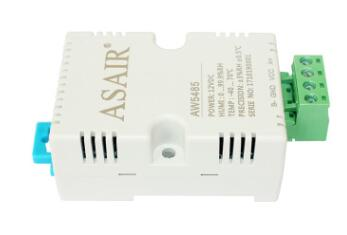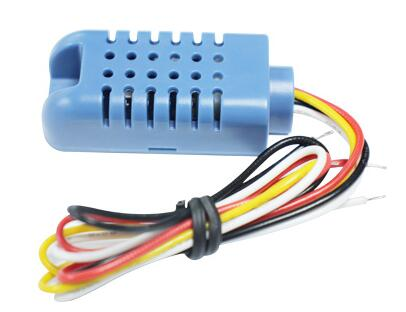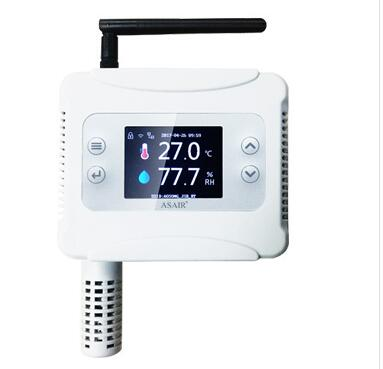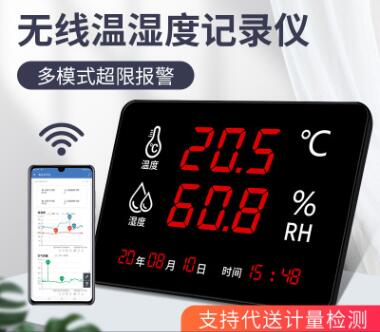
Release Time:2021-08-25 Reading Volume:0
Over the past few decades, the sensor industry has undergone earth-shaking changes. Advances in technology and the Internet of Things have led to more diverse ways of transmitting data. Various types of sensors can not only monitor data in real-time but also based on corresponding usage scenarios. Choose different data transmission methods to upload to the cloud platform to access it whenever we need it. Let's take the temperature and humidity sensor as an example to talk about the four data transmission methods of the sensor.
Let me first state that these four data transmission methods are not limited to temperature and humidity sensors. Because the temperature and humidity sensor is standard in our daily life, the data uploading method is more comprehensive and relatively representative.
The temperature and humidity sensor has four types of data upload: 485 types, analog type, network type, and wireless type.
1.Type 485
Type 485 data transmission is called RS-485 in full. RS-485 is developed based on RS-422, so some electrical regulations are similar to RS-422. For example, all adopt balanced transmission mode, and all need to connect terminal resistors on the transmission line. And 485 can choose the two-wire or four-wire mode, and the two-wire system can realize accurate multi-point two-way communication. When the four-wire system is adopted, only point-to-many communication can be realized. However, 32 devices can be connected to either the two-wire system or the four-wire system bus.
When the applicable range of RS-485 is from tens of meters to thousands of meters, the RS-485 serial bus standard is adopted. Please connect to the environmental monitoring host through the RS-485 interface, upload it to the cloud platform from the environmental monitoring host, or directly connect to the computer through USB to 485 to achieve real-time data display, historical data query, data export and other functions.

AW5485 Temperature and Humidity Transmitter
For example, Losing Electronics introduced the RS485 interface temperature and humidity transmitter-AW5485, which has a beautiful and small appearance, a standard guide rail structure design, simple wiring and easy installation. Super stability and anti-interference ability, strong product protection performance, first-class lightning protection. RS485 interface, multiple modules connected to the bus network together, real-time monitoring of multiple on-site environments. It is widely used in industrial plants, telecommunications base stations, communication rooms, HAVC HVAC, intelligent buildings, workshops, warehouses, pharmacies, libraries, museums, laboratories, offices, ventilation ducts, greenhouses and other places. It is a variety of applications The ideal solution for environmental temperature and humidity measurement and monitoring.
2. Analog type
Focus on the analog data transmission method. In the control system, whether input or output, a parameter is either an analog quantity or a switch quantity. The analog temperature and humidity sensor use analog data transmission. The analog sensor sends out a continuous signal, using voltage, current, and resistance to indicate the size of the measured parameter.
Taking the analog temperature and humidity sensor as an example, there are several output signals: 0-20mA, 0-5V, and 0-10V.
Take the 0-20mA output signal conversion calculation: for example, the range is -40~+80℃, 4~20mA output, when the output signal is 12mA, calculate the current temperature value. The span of this temperature range is 120°C, when expressed by a 16mA current signal, 120°C/16mA=7.5°C/mA, that is, 1mA represents a temperature change of 7.5°C, and the measured value is 12mA-4mA=8mA, 8mA*7.5°C/mA= 60°C. 60+(-40)=20℃, the current temperature is 20℃. The other two can be deduced by analogy.

Analog Output Type Temperature and Humidity Sensor-AM1011A
For example, the temperature and humidity sensor-AM1011A output by Aosong electronic analog model is a temperature and humidity sensor with calibrated analog signal output, the sensor signal adopts analog voltage output mode; this module has high precision, high reliability and good consistency, And with temperature compensation, to ensure long-term stability, easy to use and high-cost performance, especially suitable for enterprises with stricter quality and cost requirements. Applications include HVAC, dehumidifiers, testing and inspection equipment, consumer products, automobiles, automatic control, data loggers, weather stations, home appliances, humidity control, medical and other related temperature and humidity detection and control.
3. Network Type
①Ethernet
Ethernet is currently the most commonly used LAN technology, replacing other LAN technologies such as token ring, FDDI and ARCNET. The Ethernet type transmission method can upload the collected data to the server through the Ethernet method. Make full use of the established Ethernet communication network to realize data collection and transmission and achieve centralized monitoring. It can significantly reduce the amount of construction, improve construction efficiency and maintenance costs.
②WIFI type
The WIFI type wireless data transmission method can upload the collected data to the server through the WIFI method. Make full use of the established WIFI communication network to realize data collection and transmission and achieve centralized monitoring. It can significantly reduce the amount of construction, improve construction efficiency and maintenance costs.

WIFI Type Temperature and Humidity Transmitter-AW5145W
For example, Losing Electronics’ WIFI temperature and humidity transmitter-AW5145W, which is a network transmitter that uses a digital temperature and humidity sensor, converts the temperature and humidity in the environment into corresponding digital signals; WIFI or wired network connection, upload the temperature and humidity data to the host for real-time monitoring; the sensor uses a high-quality integrated digital temperature and humidity sensor to ensure the transmitter’s excellent long-term stability, low latency, and resistance to chemical pollution. Excellent repeatability. Applications: Meteorology, scientific research, post and telecommunications, tobacco, chemical industry, environmental protection, archives and cultural relics preservation, medical and health, hotels, food and other related temperature and humidity monitoring and control.
③GPRS type
GPRS is the abbreviation of General Packet Radio Service Technology. It is a mobile data service available to GSM mobile phone users and belongs to the data transmission technology in the second generation of mobile communications. Based on GPRS transmission, the temperature and humidity transmitter only needs a SIM card of China Mobile, China Unicom or Telecom to upload the collected temperature and humidity data to the server through the network base station.
4. Radio Type
Radio refers to electromagnetic waves that propagate in free space (including air and vacuum), and radio technology is a technology that transmits signals through radio waves.
The radio-type sensor adopts wireless spread spectrum technology. The communication distance is long, the line of sight can reach 800 meters, the penetrating ability is strong, and it can penetrate 3 to 4 concrete walls. Due to the frequency modulation technology, the communication is compared with standard radio equipment. Strong anti-interference ability.

The wireless intelligent temperature and humidity recorder launched by Aosong Electronics